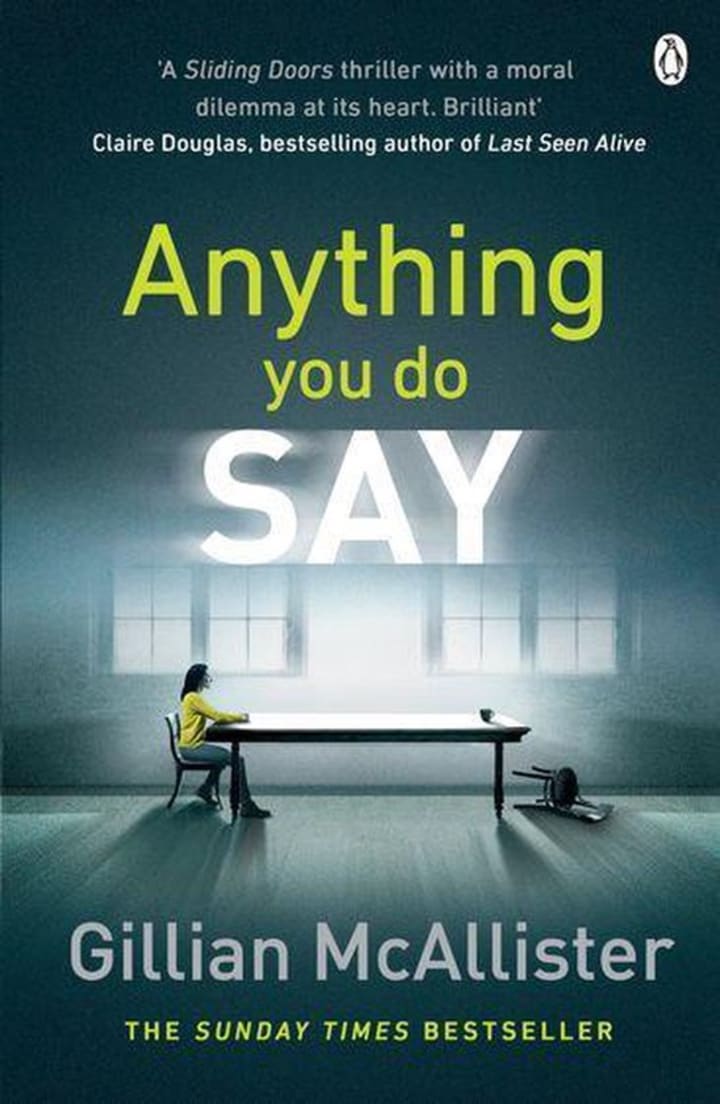"Telling a Lie" - Does it Work as the Main Plot Device of a Story?
In this blog, I would like to discuss two novels where the main plot relies heavily on characters lying to one another in the story.

I love reading and I want to love everything that I read. But, alas, I do not end up enjoying every story. There are some that I admire immensely and there are others that fail to impress me. In this blog, I would like to talk about two stories, viz., "Anything You Do Say" and "The Lying Game", that just could not hold my attention because of their main plot device - "characters lying to one another".
I understand that while telling a story, there are times when the narrators do not want to reveal ideas to the readers right away. Just enough information is provided to the readers, which is supposed to keep them hooked, and then, at an opportune moment, the whole story is divulged. At other times, the readers encounter narrators who are unreliable. By implication, it means that one cannot trust everything that the narrators are telling us, which can also lead to an interesting reveal. But what I am talking about here is a completely different situation. There are times when the readers know what has actually transpired in the story, and then, they have to witness the characters in the story lying to one another because of their underlying reservations. Or, there can be situations when the readers do not know what has indeed happened in the story, but they know that the version that has been told so far in the story is a lie. In my personal opinion, both these situations take away the ambiguity of the storytelling. Once a lie has been told, there are bound to be some associated repercussions. And the readers now know that these repercussions are going to take the story forward and not the actual event (about which the lie has been told). In other words, if there were no lies involved, there would not have been a story. This form of storytelling does not sit well with me most of the time. I just cannot get behind this idea of lying for the sake of it, without any motivation or purpose. And probably, this is why I have had a very hard time reading these two books.
"Anything You Do Say" is written by Gillian McAllister. The story is set in London and is about a woman named "Joanna". The story begins with Joanna in a bar with her friend where she starts getting unwanted attention from a guy. Once Joanna is on her own after leaving the bar, she begins to feel a little apprehensive about her surrounding. She thinks that she is being followed by the guy from the bar and grows more and more nervous and worried. The moment she thinks that the guy has come really close, she decides to physically tackle him and turns around to push him. But in an unfortunate turn of events, the guy slips and falls down a set of stairs and lands in a puddle of water. Now Joanna faces the dilemma of whether she should call the emergency services or just run away, ignoring the event altogether. From this point onwards, the story is narrated in parallel timelines - "Conceal" and "Reveal", where in one Joanna has not told anyone about the event and is going through the consequences of the same, and in the other timeline, she has called for help and things move forward from there. This concept of narration really intrigued me as it actually attempts to explore the fact that every choice has its own set of consequences.

So, the "Conceal" timeline starts with the choice that Joanna will not tell anyone, not even her family, about the incident and will move forward with her life. Personally, I will never understand why people lie to their family members, especially in case of an emergency. And, as expected, Joanna lies, feels extremely guilty about lying, and then, starts behaving awkwardly with her family. Not only does she lie about the main event but she lies about each and every mundane thing that has happened so far. For example, somewhere during the event, Joanna hurts her wrist. As Joanna has vowed not to tell the truth, she neither tells her husband about her wrist nor does she get it checked. What a stupid decision! Now, along with all the heavy guilt of lying, Joanna has to manage the burden of an injured and unattended wrist. This makes her even more miserable, both mentally and physically. In my opinion, a lot of the misery could have been avoided if the main character has not decided to lie about every single thing. Now, even in the "Reveal" timeline where Joanna has reported the event, there are incidences of lying about mundane things. However, the order of events depicted in this timeline seems much more logical as it has less of that unnecessary lying.
However, the thing that irked me the most about the narrative is that both these timelines ended up with exactly similar results, which is contrary to the tone that was set in the beginning about how every choice has its own consequences. After all the lies, the main lead ended up in the exact same spot that she would have reached if she had not lied at all. So, what was the whole point of lying in the first place? What was the point of all the guilt and turmoil the main character went through when she was lying about absolutely everything? Is the narrative trying to normalize and/or justify lying? Or does it want to convey that despite your choices, the results are always predetermined? As a reader and as a person, I can never accept the idea that two completely different choices can lead to the same result.
The next book which I wish to talk about is "The Lying Game" by Ruth Ware. It follows the story of four friends who attended a boarding school together close to London and used to play "the lying game", which essentially included lying to people about random things and tallying points depending on how big and convincing the lies were. Years later, a dead body turns up and all the four girls realize that this might be connected to their days in the boarding school. Hence, they come together once again. The story depicts a very strong bond between the main characters. There is warmth in their friendship, which was really pleasant to read about.

However, at the onset of the story, the readers are given the impression that these four girls have covered up a murder or have somehow assisted in the cover-up. Now, when a body has been found, these girls are worried about getting cornered if and when their lies are uncovered. What follows are more lies and acts of paranoia that could have been completely avoided. Again, one can spot the theme of lying, then feeling guilty followed by acting weird and then being miserable. Why go through all this pain? The problem becomes more annoying as the book never tries to address the motivation behind why the characters lie. With so much dishonesty going around, the big reveal at the end becomes very underwhelming. Nevertheless, I did end up enjoying the part which dealt with showcasing how lies and gossip can grow out of proportion and affect someone's life.
Lying, as a plot device, does not develop the story. Because there are lies involved, the story has to come back and address them, without which, the story cannot move on. This can be very annoying as readers can feel stuck at a single event for the entire book without fully comprehending the reasons. For me, personally, lying does not help develop characters as well. I would be very hard-pressed to trust a character who has been dishonest about almost everything, especially when I cannot see or understand their motivation. I can neither root for that character nor take it seriously. And therefore, I have come to realize that I cannot feel invested in a story where there is fib around every corner.
About the Creator
Kaumudi Singh
I love reading, traveling and photography. And I write because I love sharing my experiences.
Reader insights
Nice work
Very well written. Keep up the good work!
Top insights
Compelling and original writing
Creative use of language & vocab
Easy to read and follow
Well-structured & engaging content
Expert insights and opinions
Arguments were carefully researched and presented
On-point and relevant
Writing reflected the title & theme







Comments
There are no comments for this story
Be the first to respond and start the conversation.